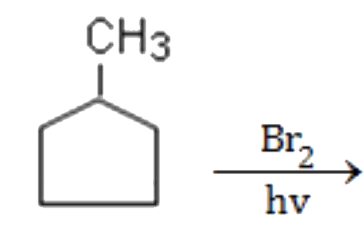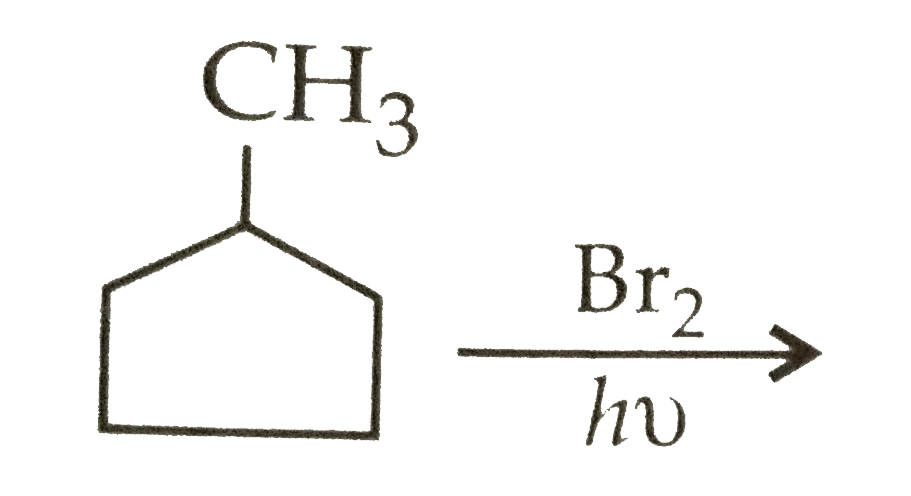In which of the following reaction product obtained is a hydrocarbon having sp hybrid carbon?
Al4C3+H2O→
CaC2+H2O→
Mg2C3+H2O→
Both (2) & (3)
To determine which reaction produces a hydrocarbon with sp hybridized carbon, let's analyze each of the given reactions step by step.
Step 1: Analyze the first reaction (Al4C3 + H2O)
1. Reaction: Aluminum carbide (Al4C3) reacts with water (H2O).
2. Products: The reaction produces aluminum hydroxide (Al(OH)3) and methane (CH4).
3. Hybridization: In methane (CH4), the carbon is sp³ hybridized (4 sigma bonds, no lone pairs).
Step 2: Analyze the second reaction (CaC2 + H2O)
1. Reaction: Calcium carbide (CaC2) reacts with water.
2. Products: The reaction produces calcium hydroxide (Ca(OH)2) and acetylene (C2H2).
3. Hybridization: In acetylene (C2H2), each carbon is sp hybridized (2 sigma bonds and 2 pi bonds).
Step 3: Analyze the third reaction (Mg2C3 + H2O)
1. Reaction: Magnesium carbide (Mg2C3) reacts with water.
2. Products: The reaction produces magnesium hydroxide (Mg(OH)2) and propyne (C3H4).
3. Hybridization: In propyne (C3H4), the terminal carbon is sp hybridized (1 sigma bond with hydrogen, 1 sigma bond with the other carbon, and a triple bond with the other carbon).
Conclusion
From the analysis:
- The first reaction produces methane (sp³ hybridized carbon).
- The second reaction produces acetylene (sp hybridized carbon).
- The third reaction produces propyne (which contains sp hybridized carbon).
Thus, the reactions that yield hydrocarbons with sp hybridized carbon are the second (CaC2 + H2O) and third (Mg2C3 + H2O) reactions.
Final Answer
The correct options are:
- Second reaction (CaC2 + H2O): Produces acetylene (C2H2) with sp hybridized carbon.
- Third reaction (Mg2C3 + H2O): Produces propyne (C3H4) with sp hybridized carbon.
1. Reaction: Aluminum carbide (Al4C3) reacts with water (H2O).
2. Products: The reaction produces aluminum hydroxide (Al(OH)3) and methane (CH4).
3. Hybridization: In methane (CH4), the carbon is sp³ hybridized (4 sigma bonds, no lone pairs).
1. Reaction: Calcium carbide (CaC2) reacts with water.
2. Products: The reaction produces calcium hydroxide (Ca(OH)2) and acetylene (C2H2).
3. Hybridization: In acetylene (C2H2), each carbon is sp hybridized (2 sigma bonds and 2 pi bonds).
1. Reaction: Magnesium carbide (Mg2C3) reacts with water.
2. Products: The reaction produces magnesium hydroxide (Mg(OH)2) and propyne (C3H4).
3. Hybridization: In propyne (C3H4), the terminal carbon is sp hybridized (1 sigma bond with hydrogen, 1 sigma bond with the other carbon, and a triple bond with the other carbon).
From the analysis:
- The first reaction produces methane (sp³ hybridized carbon).
- The second reaction produces acetylene (sp hybridized carbon).
- The third reaction produces propyne (which contains sp hybridized carbon).
The correct options are:
- Second reaction (CaC2 + H2O): Produces acetylene (C2H2) with sp hybridized carbon.
- Third reaction (Mg2C3 + H2O): Produces propyne (C3H4) with sp hybridized carbon.
Topper's Solved these Questions
Similar Questions
Knowledge Check
In which of the following reaction 2∘ alcohol is obtained as a product ?
A B
B C
C DBoth (a) and (b)
DBoth (a) and (b)In which of the following reaction cyanide will be obtained as a major product ?
APh−O∣∣C−CH3(i)LiAH4−−−−−−−−→(ii)H3O+BPh−O∣∣C−NH2NaOH−−−−−→Br2CPh−O∣∣C−NH2P4O10−−−→DPh−O∣∣C−O−HSOCl4−−−→NH3−−→
Which of the following products can be obtained from above reaction ?A B
B C
C DAll of these
DAll of these
In which of the following reaction, phosphine is not obtained as product
View Solutionwhich reaction product is hydrocarbon ?
View SolutionWhich of the following reactions would give a good yield of hydrocarbon product ?
View SolutionWhich of the following product will be obtained in the following reaction ?

View SolutionIn which of the following reactions 1,3-butadiene will be obtained as a major product ?
View Solution


